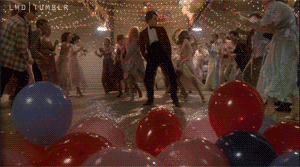
Does anyone actually use the term "gyrating" anymore? Seriously, it's about the lamest word one could possibly use to describe something as fun as dancing. I mean I really don't see "gyrating" being a part of your vocabulary unless you're an uptight chaperone at a high school dance or a citizen of the tiny dance-hating town of Footloose or, apparently, a member of the Mississippi Alcohol Beverage Control.
Last week, a Big Freedia show in Hattiesburg, Mississippi was canceled after the owner of the bar at which it was scheduled to take place was advised to pull the plug on the show by the state's ABC because it might violate their codes...because of the potential "gyrating."
"The word gyrating was in there," Ben Shemper, owner of The Dollar Box, told the Times Picayune.
What's perplexing about the cancelation and the ABC's intervention is that Big Freedia has performed in Mississippi numerous times before.

According to the bounce and reality television star, the ABC deemed Freedia's music and style of performance "too sexual" after viewing some her YouTube videos. The cancelation comes just after the release of Beyoncé's "Formation," which Freedia was notably involved in. The song and video sparked controversy because of its anti-police brutality stance and Black Panther-influenced Super Bowl performance, which prompted the NYPD to demand an apology from Beyoncé and the Miami police vowed to boycott her show and refuse to provide protection for her. It even led to the organization of a pitiful, anti-Beyoncé "rally." (Don't mess with Queen Bey, guys. It never works.)While the cancelation could be tied to all of the "Formation" buzz, what I find most disturbing about the situation is the demonization of non-White, non-heterosexual displays of sexuality.
Let's not forget that Mississippi is the proud birth-State of Elvis Presley, notorious gyrator.

 is not.
is not.
is edgy and cool while this:

is inappropriate, a joke, trashy, etc.
When I heard about the cancellation, I couldn't help but ask a question, that these days seems clichéd but is still so often necessary to ask: "Would this have played out the same way if she was white?"
In my opinion: no. In today's world, black bodies are only deemed acceptable to act sexually when they are commodities for white consumers. When these bodies are robbed of their voices, used as props, or used to revamp Miley Cyrus' career, that's okay with everybody. Sure, it'll cause a stir, but when you're a affluent white girl with a point to prove, all press is good press.

However, if you're an outspoken black performer embracing your sexuality, claiming it for yourself proudly, that's taboo. That's the butt of a joke White America will giggle at. That doesn't make you radical like Madonna, that makes you a moment at best. If you're Big Freedia, who literally could not give less of a fuck about your gender norms or sexual restrictions, that means your show gets cancelled.

It's important that we not just write off this event as Mississippi being backwards or make it a joke. Sure, it is pretty funny that "gyrating" is against the state's Alcohol Beverage Control's rules (I mean really, is Hattiesburg that town from Footloose ?!), but the way in which the state is looking at bounce reflects the way America views non-traditional (ie. straight, White) sexual expression, and nothing about that is funny.




